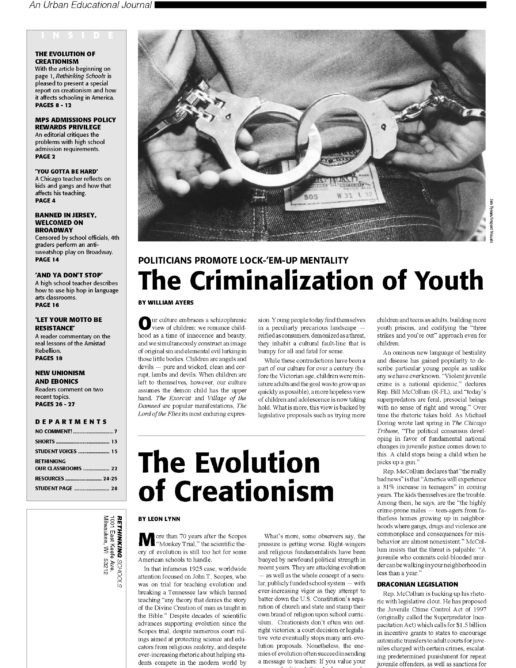MPS Admissions Policy Rewards Privilege
A Rethinking Schools Editorial
The new high school admissions policy for the Milwaukee Public Schools (MPS) is in place for the coming school year. But we encourage concerned parents, teachers, administrators, and community residents to organize to overturn this backward policy that relegates the majority of high school students in MPS to second-class status.
With minimal public input, this fall the Milwaukee School Board adopted a policy under which high schools could develop admissions standards. The city’s three most popular schools did so: Rufus King High School, Riverside University High School and Milwaukee High School of the Arts (MHSA). King and MHSA instituted particularly restrictive entrance requirements.
Fundamentally, the policy is about protecting and rewarding privilege. Its ultimate result will be a two-tiered educational system in MPS high schools, one for the haves and one for the have-nots. Across the country, studies have repeatedly shown that one of the key determinants of school success is the family’s income level. More affluent students, with all the privileges that money can buy — from computers to books to teachers’ expectations of success — tend to score higher on standardized tests, have better grade point averages, and have access to private music, art, and sports lessons.
Fundamental Questions
The admissions initiative raises fundamental questions about the role of public education. For example:
- What does it mean when some schools will have a more selective student body but all schools will be held to the same accountability measures?
- Should public schools mimic private schools and screen students? Or should public schools be expected to equitably serve the needs of all students?
- Is it good public policy to view entrance to a quality high school as a “reward,” when it is a basic necessity for survival?
- What will happen to those high schools which have worked hard to develop high standards and innovative programs — but who don’t have the reputation or aura of schools such as King?
- Will such a policy lead to an imbalance in which the best students — whether in academics, leadership abilities, or other attributes — are concentrated in a few select schools?
- Should policy be developed with the needs of the most successful students in mind, or the least successful students?
If the school board were truly concerned with helping those most in need, why not send some of the most problematic kids to King or Riverside? Why not let the best schools and the best teachers and the best programs work their magic on kids who need the most help?
This year, little can be done to reverse the new admissions policy. However, there are several areas that bear particular watching. Most important is whether the admissions standards are being implemented as fairly and impartially as possible.
First, will care be taken be protect equity not only in terms of race and gender but the income level of the students’ families? Second, will clear guidelines be established so that students with exceptional educational needs will have their full rights respected? Already, Rufus King serves fewer children with exceptional needs than many other schools (5% of the student body compared to a districtwide high school average of 11.2%.) Further, preliminary indications are that these three schools are showing minimal flexibility in modifying their entrance requirements for students with exceptional needs. In the same regard, will provisions be made so that the entrance requirements are not used to limit the opportunities of students who do not speak English as their primary language?
Finally, will King, Riverside, and High School of the Arts receive the same ratio of students placed into high school during the year, many of whom are students coming from the judicial system? Already, these three schools apparently are not pulling their weight. For example, for figures through October, Marshall High School received 19 late enrollees compared to 8 for Riverside and 6 for King (all three schools are approximately the same size); High School of the Arts received 8 students.
High Standards For All
The admissions proposal is being cloaked in the rhetoric of high standards. Who can be against high standards? But the policy turns the concept of standards on its head. Standards should be a way to boost the performance of all. They never should be a roadblock, used to track students and deem some more worthy than others of a quality education. MPS proudly proclaims on banners outside every school: “High Standards Start Here.” The admissions policy makes a mockery of that statement. Perhaps a more appropriate slogan for these select schools would be: “Privilege Starts Here.”
Ironically, some of the strongest supporters of the new admissions policy are advocates of vouchers and school choice. The policy is a hypocritical perversion of choice. In essence, it says to students: some of you get choices and some of you don’t. The bottom line is that these schools are doing the choosing, not the students.
Fundamentally, the new admissions policy is about protecting and rewarding privilege. It isn’t hard to understand the real politics of what is going on. The proposal is in line with the perspective that the best way to “save” the public schools is to cater to the middle class and create a system within the system for middle-class kids.
Is this really the direction we want for MPS and for our community?

